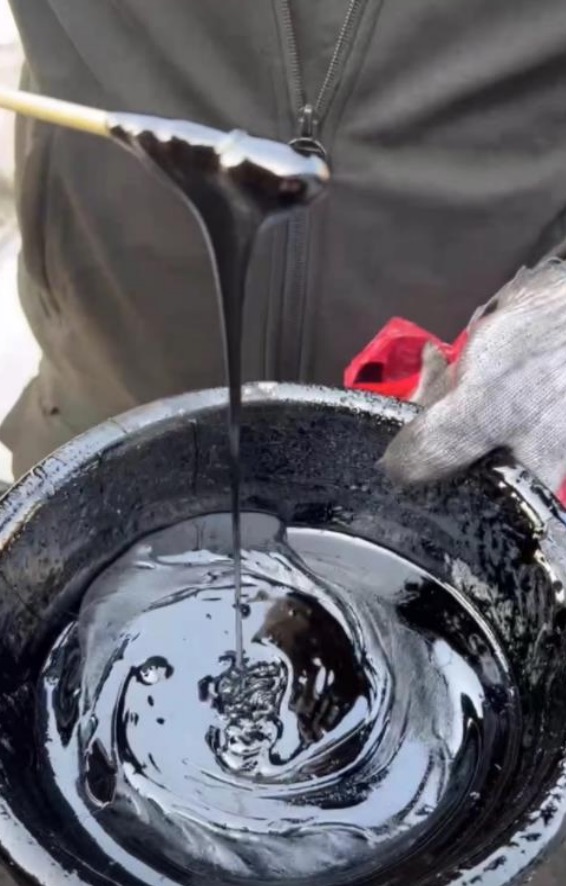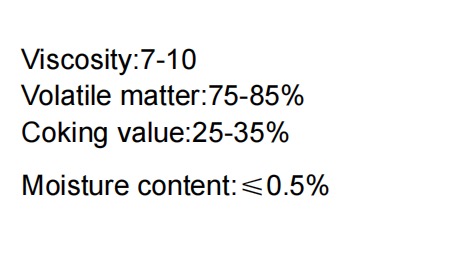Catrame anidro
Il catrame anidro è un prodotto chimico ottenuto durante il processo di distillazione ad alta temperatura del carbone. Si tratta di una miscela complessa composta principalmente da composti aromatici policiclici, inclusi nafteni, alcani e fenoli.
Il catrame anidro si ottiene rimuovendo l'acqua dal catrame di carbone ed è un sottoprodotto delle imprese di cokeria. Durante il processo di distillazione secca, gli impianti di cokeria producono coke e semi-coke, ottenendo così il catrame anidro.
Utilizzi del catrame anidro:
Come combustibile:
Il catrame anidro ha un elevato potere calorifico e può essere utilizzato come combustibile o additivo per combustibili.Nell'industria chimica:
È una materia prima importante per la produzione di plastica, fibre sintetiche, coloranti, gomma, prodotti farmaceutici e materiali resistenti alle alte temperature.Nell'industria dei materiali da costruzione:
Viene utilizzato per produrre calcestruzzo bituminoso e materiali impermeabilizzanti per tetti.Nell'industria farmaceutica:
Il catrame può essere utilizzato per produrre alcuni prodotti chimici e vernici. Dopo un trattamento e una raffinazione approfonditi, può anche essere utilizzato per produrre materiali impermeabilizzanti di alta qualità, materiali isolanti e materie plastiche ecologiche.
Processo di produzione del catrame anidro:
Il processo di produzione del catrame anidro include principalmente la distillazione del catrame e la decomposizione per lavaggio. Attraverso questi passaggi, è possibile separare dal catrame una varietà di prodotti chimici. Nello specifico:
Distillazione del catrame:
Separazione dei diversi componenti del catrame in base ai loro punti di ebollizione, ottenendo frazioni con diverse temperature di distillazione.Decomposizione per lavaggio:
Lavaggio del catrame con soluzioni alcaline per rimuovere impurità e composti fenolici, migliorando così la qualità del catrame.
Anhydrous tar is a chemical product, which is a complex mixture produced in the process of high-temperature dry distillation of coal, mainly composed of polycyclic aromatic compounds, including naphthenes, alkanes and phenols.
Anhydrous tar is obtained by removing the water in coal tar, which is a by-product of coal coking enterprises, and is obtained by the coal coking unit when the coal is produced from coke and semi-coke by a dry distillation process.
Anhydrous tar is used as a fuel: Anhydrous tar has a high calorific value and can be used as a fuel or fuel additive.
Application in chemical industry: anhydrous tar is an important raw material for the production of plastics, synthetic fibers, dyes, rubber, medicine, high-temperature resistant materials and other industrial products.
Application in the building materials industry: used in the manufacture of asphalt concrete, roof waterproofing materials, etc.
Applications in the pharmaceutical industry: Tar can be used in the manufacture of certain chemicals and paints, after advanced treatment and refining, it can also be used to make high-quality waterproofing materials, thermal insulation materials and environmentally friendly plastics.
The manufacturing process of anhydrous tar mainly includes steps such as tar distillation and washing decomposition, through which a variety of chemical products can be separated from tar. These include:
Tar distillation: The different components in the tar are separated by distillation to obtain fractions with different boiling points.
Washing and decomposition: Wash the tar with an alkaline solution to remove impurities and phenolic compounds in it and improve the quality of the tar.
The color is black and bright, and can be produced as per customer’s requirements. Daily output is 300 tons, with long-term stability.

